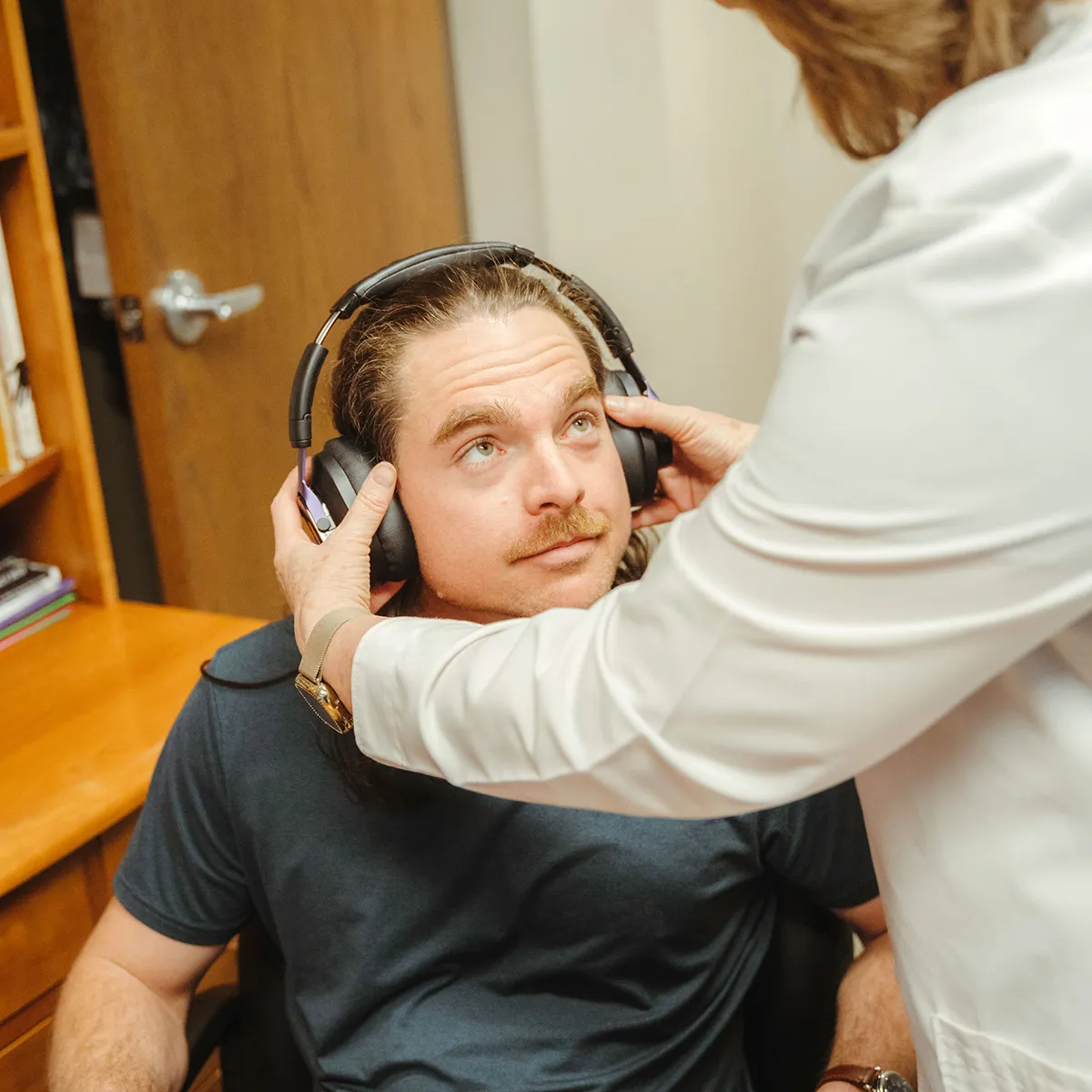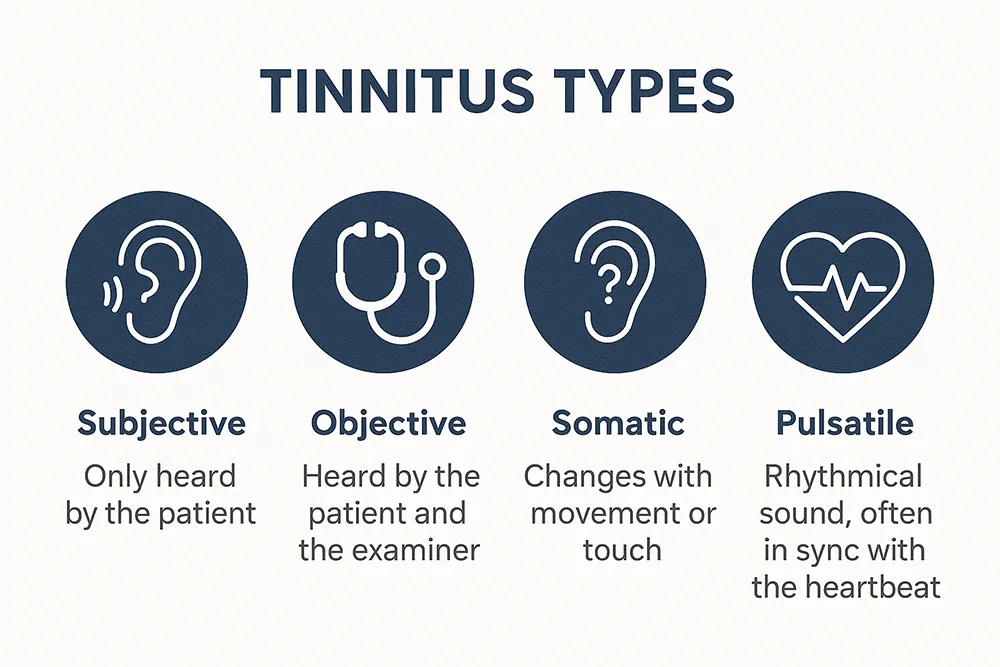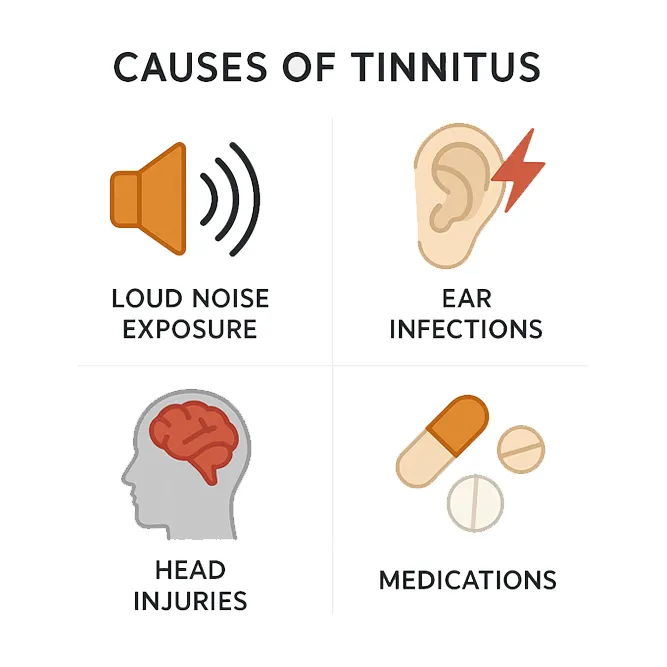
Understanding Tinnitus
Approximately 50 million Americans have tinnitus. It’s a common condition that can disrupt sleep, make it hard to concentrate, and even take a toll on your mood. While there’s no single cure, understanding tinnitus and its causes is the first step toward effective treatment and relief.
What is Tinnitus?
Tinnitus is the perception of sound when no external sound is present. People often describe it as ringing, buzzing, hissing, humming, crickets, or whooshing. It can be constant or intermittent, soft or loud, in one ear, both ears, or “in the head.” Tinnitus is pronounced either “tin-ni-tus” or “tin-night-us”-both are correct. While it may feel like an isolated issue, in more than 90% of cases, tinnitus is related to hearing loss—specifically, the loss of nerve connections between the ear and the brain.
.jpg)
Why Tinnitus Happens
Your ears and brain work together to help you hear. When the ear’s input is reduced (from hearing loss, noise exposure, or even temporary blockage), the brain attempts to “fill in the gap” by creating sound where there is none. Tinnitus is a symptom, not a disease. It’s usually the result of changes in the hearing system and how the brain processes sound.

Types of Tinnitus
Tinnitus is also classified further into subjective or objective types.
- Subjective tinnitus – This is a noise perceived by the patient alone and is quite common.
- Objective tinnitus – This is a noise perceived by the patient as well as by another listener. This form of tinnitus is relatively uncommon, and the location of tinnitus may be in the ear(s) and/or in the head.
Common Causes of Tinnitus Include:
- Stress and depression
- Hearing loss
- Exposure to loud noises (heavy equipment, chain saws and firearms, portable music devices).
- Earwax buildup or blockages
- Abnormal bone growth in the ear (Stiffening of the bones in your middle ear (otosclerosis) may affect your hearing and cause tinnitus. This condition, caused by abnormal bone growth, tends to run in families).
- Meniere’s disease (an inner ear disorder that may be caused by abnormal inner ear fluid pressure).
- Head or neck injuries
- Benign tumor of the cranial nerve (noncancerous (benign) tumor develops on the cranial nerve that runs from your brain to your inner ear and controls balance and hearing. Also called vestibular schwannoma, this condition generally causes tinnitus in only one ear).
- TMJ disorders (Problems with the temperomandibular joint, the joint on each side of your head in front of your ears, where your lower jawbone meets your skull, can cause tinnitus).
- A natural part of the aging process (hearing worsens with age, usually starting around age 60. Hearing loss can cause tinnitus. The medical term for this type of hearing loss is presbycusis).
- High blood pressure (Hypertension and factors that increase blood pressure, such as stress, alcohol and caffeine, can make tinnitus more noticeable).
- As a side effect of medications (e.g. aspirin or other ototoxic drug)
In order to find out the root cause of your tinnitus, our audiologist will conduct a complete medical history, as well as a complete examination.

Impact of Tinnitus
Tinnitus affects every person differently. The most common areas in which tinnitus has a direct influence are:
Many people who suffer from tinnitus report being annoyed, bothered, depressed, anxious or angry about their tinnitus. They think and focus on their tinnitus frequently and are more disturbed in quiet environments.
Many tinnitus sufferers report that their tinnitus interferes with their ability to get to sleep. It can also make it more difficult to get back to sleep when they wake up in the middle of the night.
Some tinnitus sufferers report that they have difficulty focusing on various tasks because of their tinnitus. This might include reading a book, newspaper, or attending to a task at work.
For some, the sound of the tinnitus competes with or masks speech or environmental sound perception.
.jpg)
Tinnitus Solutions
We offer comprehensive, evidence-based tinnitus treatments tailored to your unique needs. From advanced FDA-approved devices to personalized therapeutic approaches, we'll work with you to find the right solution for your tinnitus relief.
Cognitive Behavioral Therapy
Discover how Cognitive Behavioral Therapy at Colorado Tinnitus & Hearing Center helps reduce distress and improve quality of life for tinnitus patients.
Biometric Tracking
Discover how biometric tracking at Colorado Tinnitus & Hearing Center personalizes your tinnitus treatment by analyzing your body's responses and identifying triggers.
Tinnitus Retraining Therapy
Discover effective Tinnitus Retraining Therapy (TRT) at Colorado Tinnitus & Hearing Center. Our expert audiologists provide personalized treatment to reduce tinnitus distress.
Modern Tinnitus
Discover cutting-edge tinnitus treatments at Colorado Tinnitus & Hearing Center. Our personalized approach combines technology and holistic methods for effective relief.
Biofeedback Therapy
Experience effective biofeedback therapy at Colorado Tinnitus and Hearing Center. Reduce stress and improve your emotional resilience today!
Neuromonics
Discover effective tinnitus relief with Neuromonics at Colorado Tinnitus and Hearing Center. Experience personalized treatment and regain control over your life.
Lenire Tinnitus Treatment
Experience long-term tinnitus relief with Lenire, the FDA-approved treatment offered by expert audiologists at Colorado Tinnitus and Hearing Center.




